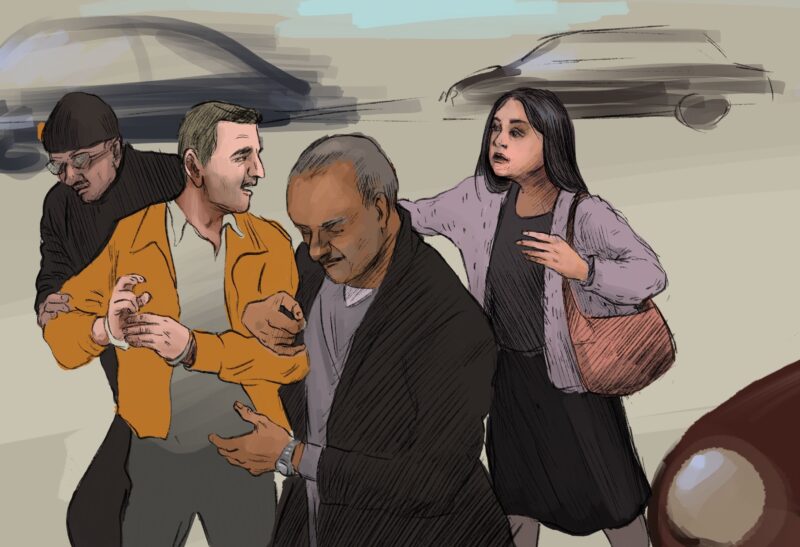Hitchhiking feminist Fidan Nazarova shares her unusual form of protest with Meydan TV – and how it could change society.
A wish for seven sons
At traditional Azerbaijani weddings, the groom’s best man ties a red band around the bride’s waist and makes a wish: ‘I want seven sons and just one daughter.’ This ritual illustrates the expectations and gender roles that prevail in Azerbaijani society until today. According to the latest data from the Azerbaijan State Statistics Committee, 112 boys are born for every 100 newborn girls, whereas the norm is 105 girls per 107 boys. One of the main reasons for the mismatch are selective abortions. Across the world, Azerbaijan holds the
second-highest rank
for number of selective abortions – only China has more.
As soon as girls mature, they become a target for discrimination. In the regions, child labor is still an acute problem, as girls who have barely learnt how to read and write are taken out of school to help their parents around the house.
Another challenge is the practice of early marriage. According to official statistics alone, 400 to 600 minor girls – usually between the age of 15 and 17 – are married off every year. While such marriages are criminally punishable, there have been no legal proceedings so far.
Eldar Zeynalov, the director of the Azerbaijani Human Rights Center, says that the traditional idea of a ‘real woman’ in Azerbaijan is a modest housewife, not too educated, who ‘sits at home’ and raises children.
‘There are no regulations in the country that prevent girls from going to school’,
he explains
. ‘But [in conservative circles] education has stopped being valued and is even an impediment.’
An official report published by the Ministry of Health found that approximately 35 percent of women in Azerbaijan were victims of domestic violence in 2017. Current legislation does not consider early marriage as a form of domestic violence, as is the case in some other countries.
In January 2018, Azerbaijan did not sign the
Istanbul convention of the Council of Europe
on the fight against violence against women, which obligates signatory governments to take action in combating violence against women.
A law on the prevention of domestic violence is in place, but it does not work.
On the
2017 Global Gender Gap Index
, published annually by the World Economic Forum, Azerbaijan ranked 98th out of 144 countries. In the recently published
2018 report
, it ranked 97th out of 149 countries.
Great interest
Rights activist and member of the LGBT alliance Nefes Gulnara Mehdiyeva believes that inequality is linked to the overall weakening of democratic institutions in the country.
During the last decade, the civil society sector in Azerbaijan has shrunk noticeably. Due to the constant persecution of rights groups and activists, the number of NGOs working in Azerbaijan has fallen from 200 to 50. And for those which remain, it’s hard to operate,
according to
Avaz Hasanov, director of the Non-Governmental Union for Humanitarian Research.
Nevertheless, there are still active voices in society that advocate for gender equality.
‘The influence of feminism will eventually be felt in Azerbaijan as well’, Gulnara Mehdiyeva, expert on gender-related issues, says. ‘Even the term ‘gender’ as such has taken root. For now, however, reactions are negative, but the topic as such generates great interest.’
Unfortunately, ‘great interest’ may mean open aggression against those women who found the courage to voice their opinions.
Without family permission
Activist Fidan Nazarova is packing her backpack.
‘We live in a patriarchal country, in which society dictates a woman’s every step – what she should do at a certain age and how she should behave in certain places’, she says. ‘Even how and with whom a woman should travel is determined by an unwritten code of rules. But I want to show that women are independent and free, at least when traveling.’
Fidan’s way of campaigning for gender equality is fairly uncommon – she travels the world. To make her ideas heard by as many people as possible, she travels by hitchhiking, which is, from the point of view of traditional Azerbaijani society, the most extreme form of traveling.
‘I want to show that a woman can be independent. This includes her right to live outside her homes and her ability to hitchhike, if she wants to. And she does not have to ask her father or brother for permission,’ Fidan defiantly says.
Hitchhiking can be unsafe though, particularly for women.
‘You get in the car of someone you see for the first and last time in your life,’ the activist says. ‘Anything can happen of course.’ She says that she has experienced very dangerous situations several times and was at risk of getting raped twice.
On social media, Fidan shares the experience she accumulated in the course of five years of intensive travels. She shares stories about how to protect oneself in dangerous places and situations, she answers questions, and gives advice to other travelers.
‘When I decided to go on my first trip, no one could give me advice because there were just no woman travelers. And the men simply told me to take a pepper spray with me. But then I found out that these sprays are actually banned in some countries.’
‘Awaited’ back at home
Women usually follow the updates on Fidan’s Facebook page with interest and are grateful for the information she shares. Many men, however, see her behavior and the beliefs she promotes as a threat.
‘People regularly threaten or scold me. I have not been home for a long time, but I know from the text messages I receive on Facebook that those who write them are ‘waiting for me’ in Azerbaijan. That’s certainly unpleasant, but my response is to just ignore it.’
‘Hitchhiking takes confidence and bravery. The road will teach you how to act,’ Fidan believes.
She says that it’s on the road where people will feel really free: ‘In life, you come across bans and rules all the time. On the road, however, you will not see a single traffic sign from ‘women can’t do it’ category.’



